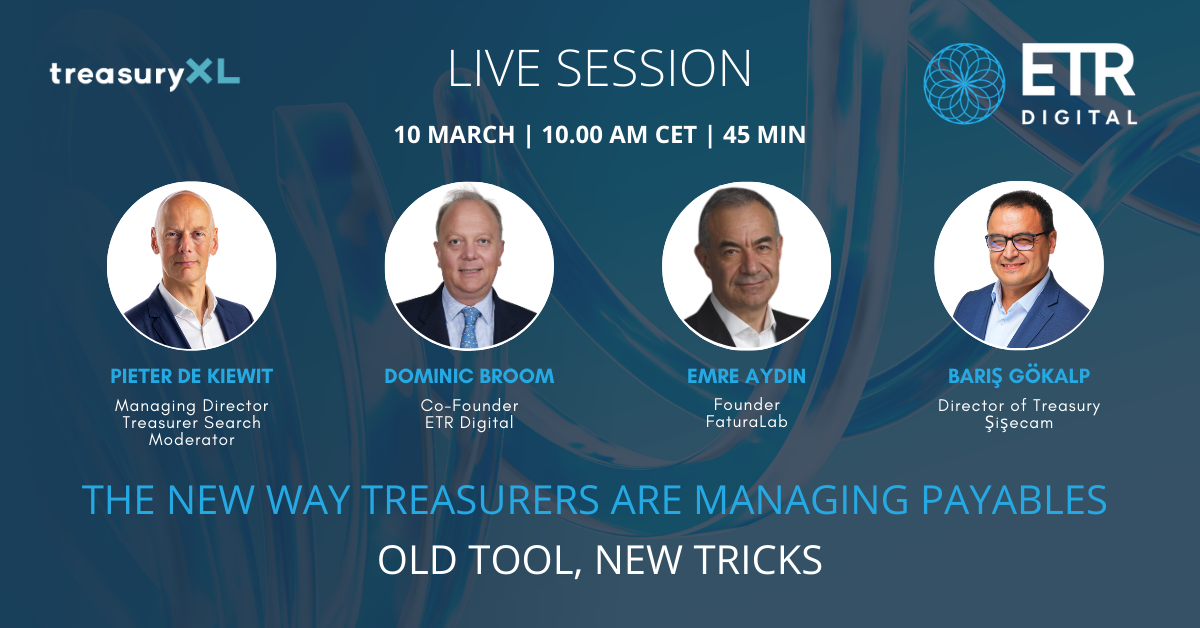| 29-11-2016 | Carlo de Meijer |
 Today, I was invited to participate in a Challenge meeting at the Euroforum Fintech event in Amsterdam. My challenge was the following. Suppose we are somewhat further in time. Blockchain is far beyond the hype, the initial overdone expectations have been brought to a more realistic level and the technology is generally accepted as having enough opportunities for the financial industry. Your company is convinced this technology will suit their business. A number of blockchain applications have been chosen to use in your day-to-day activities. That is the easy part.
Today, I was invited to participate in a Challenge meeting at the Euroforum Fintech event in Amsterdam. My challenge was the following. Suppose we are somewhat further in time. Blockchain is far beyond the hype, the initial overdone expectations have been brought to a more realistic level and the technology is generally accepted as having enough opportunities for the financial industry. Your company is convinced this technology will suit their business. A number of blockchain applications have been chosen to use in your day-to-day activities. That is the easy part.
Now the decision has been taken to adopt this technology, there comes a new challenge: how to integrate blockchain and implement this technology into the existing business and incorporate it within your legacy enterprise applications. In other words: how to make it operational!
Making blockchain work: the Challenges
That is where the real work starts. Making blockchain applications work in the real day-to-day world. That may prove as much of a challenge – or even more than that – as building the blockchain application itself. Because blockchain is a complete different and unprecedented, technology, corporates are confronting problems related to integration of the blockchain into the enterprise. Most financial organisations have to take into account their existing complex business lines and the legacy (and mostly old) technology they use. But also the various regulatory obligations have to be taken into consideration.
And there is another – maybe even bigger – challenge. Most banks nowadays heavily depend on massive and (capital-) expensive financial processing systems. These are often 15 years old (or even older!). But these systems do power the many transactions between the world’s major businesses and governments. Trying to overhaul them altogether is a formidable task, and may come with a huge risk. Disrupting them, even for a short time, could be disastrous.
Blockchain integration: points of attention
When deciding to integrate blockchain in your company, you should take a number of important issues into consideration. Every financial company that is serious about blockchain needs also to be serious about issues such as: compliance and regulatory requirements; Enterprise integration with internal systems and data repositories; connectivity to a partner ecosystem; interoperability requirements and access layer; visibility into—and real-time monitoring of—blockchain-based transactions; automated process orchestration; life cycle events; access controls; governance, and more.
Compliance and regulatory requirements
In the near term, KYC/AML models should be developed that could be integrated into enterprise blockchain. Without a thoughtful consideration of KYC/AML and other related regulatory applications, it will be a difficult story to realise that. These models should include concepts such as an inter-ledger, side chains etc. But in such a systematic way to take advantage of blockchain’s way of processing transactions. These models should enhance existing AML/KYC processes thereby overcoming shared data/ledger challenges.
Enterprise integration with incumbent internal systems and data repositories
Another consideration is: how to integrate blockchain with incumbent record systems. Corporates have been creating their own business systems to better measure and manage the business. These include issues such as reporting, analytics, business application management, dashboard, counter-fraud management, etc. Many of these systems “feed off” of the enterprise’s System(s) of Record (SoR) with all kind of information. Integration blockchain in an enterprise suggests a system design around integrated transaction systems (trust systems) and record systems (shared ledger); any application that is either transitioning or originating using blockchain technology would need to consider the enterprise systems for tangent business activity.
Interoperability and access layer
And there is the interoperability issue; may be the most important one. Interoperability of blockchain within an enterprise will be key. Every enterprise has legacy technology that must be interoperable with blockchain, from KYC to risk management and settlements. These applications have to engage seamlessly with the new blockchain applications. In order to make that possible, organizations need to use a so-called access layer to ensure complete interoperability. Such an access layer makes it possible to abstract the complexities of blockchain and smart contracts; expose the functionalities of the blockchain application; and, communicate them to legacy applications.
Automated process orchestration
Although private blockchain transactions occur in a closed environment, they however may impact events both inside and outside the chain. Technology is thereby critical to make these on-and off-chain applications interoperable in an automated fashion. Automated process orchestration is thereby needed, as it enables blockchain events to trigger processes across multiple off-chain and on-chain applications.
Life cycle event
Lifecycle events need to be managed too. Through a total surveillance module, the access layer has complete visibility of every event in the blockchain network; with that visibility the analytics engine can detect anomalies and gather intelligence. For example, when a counterparty exercises an option on a smart derivatives contract in the blockchain, that event needs to be captured and propagated to the same downstream systems. Similarly, external events, such as those relating to market data, will also need to be monitored and applied to the smart contracts. You will need to plan for integrating those systems. But before doing that you will have first identified what systems are affected and how.
Governance
And there is the governance issue. What happens in a blockchain application can have an impact across the whole enterprise. So careful monitoring off- and on-chain is necessary in order to enable proper governance, risk management and security of the entire network. Integration that is technology-neutral and the ability to establish and execute the policies required for good governance are key to the blockchain access layer. API-based integration could thereby be of help.
Other requirements
But here it does not end. New higher-level processes may also need to be established to exploit the benefits from the blockchain ecosystem. The interoperability between systems will have to be agile, secure and have robust governance. It should be prevented that enterprise applications would be exposed to any complexities of the blockchain. Operationalizing blockchain also addresses the need for access controls over the participants, from both an application and business context, be it internal or external to the enterprise.
Integration: steps to be taken
To gain the real advantages of blockchain technology, a company must be able to rapidly, but seamlessly utilize blockchain. Without having to run complex, costly and lengthy re-architecturing programs. But what is the best approach to operationalize blockchain?
Here are six steps you should keep in mind:
First, you need to connect to a (private or public) blockchain ecosystem and/or with external parties using the blockchain.
Second, you have to integrate blockchain applications with existing technology.
Third, you will have to decide how to interact with the blockchain ecosystem, with regards to security and access controls.
Fourth, you have to figure out how to monitor transactions and events on the blockchain and react to them in real time.
Fifth, you have to decide how to reconcile data that exists in blockchains as well as legacy applications.
Sixth, you have to automate, coordinate and manage the processes that span both existing technologies and blockchains.
Conclusion
While blockchain technologies are viewed as a disruptive force for the existing financial systems and market infrastructures and may fundamentally change the way the financial services industry operates day-to-day business, the challenges of enterprise adoption and integration need to be addressed as well.
The introduction of blockchain in your company will require the well needed time. You will have to address the enterprise issues around transaction audibility, visibility and integration into existing business functions. Without this, a profitable integration of the blockchain in the company will prove to be a difficult storey.
Of course this story is not yet complete. I will definitely have forgotten things that must also be considered. But this is a start!

Carlo de Meijer
Economist and researcher
 Treasurers are confronted with new data every day – just think of the daily download from the bank statements. As this is a constant process, treasurers need to able to perform real-time financial analysis.
Treasurers are confronted with new data every day – just think of the daily download from the bank statements. As this is a constant process, treasurers need to able to perform real-time financial analysis.


 Maarten Verheul – Treasury Consultant
Maarten Verheul – Treasury Consultant Er staat op dit moment veel in het nieuws over rentederivaten en de ontwikkelingen rond deze producten. Rentederivaten kunnen nuttig zijn om het renterisico af te dekken, het zijn echter ingewikkelde producten. Als treasurer zult u de werking en de risico’s van het product goed begrijpen. Als u toch behoefte heeft aan voorlichting kunt u zich laten informeren door uw bank. Daarnaast kunt u kennis over de werking van deze producten in huis halen, bijvoorbeeld bij een advieskantoor dat zich specialiseert op het gebied van rentederivaten.
Er staat op dit moment veel in het nieuws over rentederivaten en de ontwikkelingen rond deze producten. Rentederivaten kunnen nuttig zijn om het renterisico af te dekken, het zijn echter ingewikkelde producten. Als treasurer zult u de werking en de risico’s van het product goed begrijpen. Als u toch behoefte heeft aan voorlichting kunt u zich laten informeren door uw bank. Daarnaast kunt u kennis over de werking van deze producten in huis halen, bijvoorbeeld bij een advieskantoor dat zich specialiseert op het gebied van rentederivaten. 
 ‘We overschatten de snelheid waarmee de financiële wereld kan veranderen’ is de titel van een interessant artikel in het Financieele Dagblad van woensdag 30 november.
‘We overschatten de snelheid waarmee de financiële wereld kan veranderen’ is de titel van een interessant artikel in het Financieele Dagblad van woensdag 30 november.
 Waar zondagnacht (11 PM Amsterdamse tijd) de EUR/USD nog een aardige push omlaag kreeg vanwege de ‘Italië-uitkomst’, is dit weer ongedaan gemaakt tijdens de Europese openingsuren. Van paniek is geen sprake, aangezien een beweging van een cent relatief gezien gering is.
Waar zondagnacht (11 PM Amsterdamse tijd) de EUR/USD nog een aardige push omlaag kreeg vanwege de ‘Italië-uitkomst’, is dit weer ongedaan gemaakt tijdens de Europese openingsuren. Van paniek is geen sprake, aangezien een beweging van een cent relatief gezien gering is. Udo Rademakers – Independent Treasury Consultant & Interim Manager
Udo Rademakers – Independent Treasury Consultant & Interim Manager Mijn eerste ontmoeting met Theo zette de toon voor al onze verdere contacten. Het was aan het einde van de DACT Treasury Beurs 2009 in Noordwijk. Velen waren al gestart met hun weekend, ook de standhouders waren al aan het afbreken. Ik was net gestart met mijn onderneming. Theo en ik raakten in gesprek. De mooiste gesprekken in mijn vak zijn met mensen met een passie. Dat ik hier te maken had met de Nederlandse treasury goeroe was me al snel duidelijk. Hij leidde me langs de belangrijkste topics in treasury in die tijd. De Register Treasurer opleiding bleek één van zijn passies. In ons beider enthousiasme hebben we serieus onderzocht of ik de studie zou oppakken. Voor alle betrokkenen was het goed dat dat plan niet is doorgezet en dat de kwaliteit van alumni hoog blijft.
Mijn eerste ontmoeting met Theo zette de toon voor al onze verdere contacten. Het was aan het einde van de DACT Treasury Beurs 2009 in Noordwijk. Velen waren al gestart met hun weekend, ook de standhouders waren al aan het afbreken. Ik was net gestart met mijn onderneming. Theo en ik raakten in gesprek. De mooiste gesprekken in mijn vak zijn met mensen met een passie. Dat ik hier te maken had met de Nederlandse treasury goeroe was me al snel duidelijk. Hij leidde me langs de belangrijkste topics in treasury in die tijd. De Register Treasurer opleiding bleek één van zijn passies. In ons beider enthousiasme hebben we serieus onderzocht of ik de studie zou oppakken. Voor alle betrokkenen was het goed dat dat plan niet is doorgezet en dat de kwaliteit van alumni hoog blijft.



 Today, I was invited to participate in a Challenge meeting at the Euroforum Fintech event in Amsterdam. My challenge was the following. Suppose we are somewhat further in time. Blockchain is far beyond the hype, the initial overdone expectations have been brought to a more realistic level and the technology is generally accepted as having enough opportunities for the financial industry. Your company is convinced this technology will suit their business. A number of blockchain applications have been chosen to use in your day-to-day activities. That is the easy part.
Today, I was invited to participate in a Challenge meeting at the Euroforum Fintech event in Amsterdam. My challenge was the following. Suppose we are somewhat further in time. Blockchain is far beyond the hype, the initial overdone expectations have been brought to a more realistic level and the technology is generally accepted as having enough opportunities for the financial industry. Your company is convinced this technology will suit their business. A number of blockchain applications have been chosen to use in your day-to-day activities. That is the easy part.
 We came across an interesting ‘panorama’ from McKinsey& Company about the key Fintech trends and asked our expert Hans de Vries to comment on it. He came back with interesting insight, that we want to share with you:
We came across an interesting ‘panorama’ from McKinsey& Company about the key Fintech trends and asked our expert Hans de Vries to comment on it. He came back with interesting insight, that we want to share with you:

